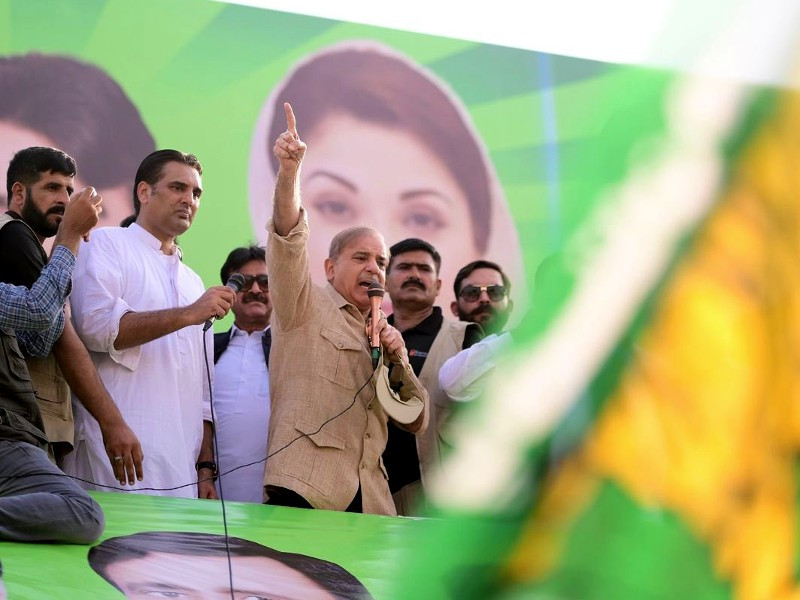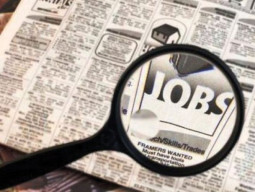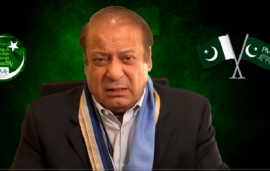
PML-N President Shehbaz Sharif on Wednesday said party supremo Nawaz Sharif's imminent return was not intended to seek revenge but rather to heal the wounds of the nation – a message that the party has emphasised several times in the past few days in an attempt to clear the air.
Addressing party workers in his constituency, Shehbaz said the former prime minister’s only "crime," was to end load-shedding, combat terrorism, develop a wide network of roads and motorways, provide free medicine to those in need, offer scholarships to bright minds, and distribute thousands of laptops.
He said Nawaz was sent behind bars as part of the conspiracy to pave the way for fascism in Pakistan.
The statement came as the PML-N went into full throttle on Wednesday as they raced against time to build momentum in Lahore before the expected arrival of the former prime minister on October 21.
The party held multiple events across the city, including a whirlwind tour by Shehbaz Sharif in his own constituency.
Addressing party workers at various designated locations, Shehbaz took the opportunity to remind the people about the "prosperous era" of his elder brother Nawaz Sharif's tenure from 2013 to 2017.
The underlying theme of all the speeches, including those by Saad Rafique and Ahsan Iqbal, emphasized how Nawaz Sharif had previously steered Pakistan away from the brink of disaster in 2013.
They also highlighted the PML-N supremo's promise to undo the damage caused by Imran Khan's Pakistan Tehreek-e-Insaf (PTI) and bring the nation back on the path to prosperity.
Common in all these interactions was the shifting of blame for the abysmal performance of the PML-N's sixteen-month government onto the previous PTI administration, with claims that the PML-N had, in fact, saved Pakistan from default.
Similarly, former Punjab chief minister and PML-N central leader Hamza Shehbaz also addressed a workers convention in Model Town.
Defending abysmal performanceDuring his address, Shehbaz further claimed that the “conspiracy” behind sending Nawaz to prison was an attempt to bring fascism to Pakistan. The aftermath witnessed a culture of animosity, the mainstreaming of abusive language, and the emergence of divisive politics, pushing away friends of Pakistan and isolating the nation.
He also highlighted how Nawaz managed to keep the prices of essential commodities, such as sugar and wheat, within the reach of the poor.
The young Sharif passionately expressed that the ‘son of the soil’ was returning to put Pakistan back on the road to prosperity and claimed that if Nawaz had not been removed from power, Pakistan was poised to become a developed nation.
It was not Nawaz Sharif who lost power but rather the Pakistanis who lost a brighter future, he claimed.
Highlighting the accomplishments of Nawaz Sharif's tenure, such as the advancements in Danish Schools and free treatment of Hepatitis, Shehbaz noted that these efforts to uplift the population from poverty abruptly came to a halt due to what he referred to as a forged case that pushed Pakistan into an abyss.
Defending his own government's poor performance on all fronts, he highlighted the dire situation they inherited when they assumed power.
He stated that Pakistan was on the brink of default and blamed Imran Khan for reneging on an IMF agreement, which led to stringent terms during his term in office.
Shehbaz acknowledged that there was a realisation taking over the government was politically unwise, but they prioritised national interest over politics.
Addressing his workers at another location, Purana Kahana, the party president said that Nawaz pledged to try his best to end load shedding during his terms as PM and then kept this promise.
Nawaz Sharif even refused an offer of five billion to hold back from testing the nuclear bomb.
Citing the China-Pakistan Economic Corridor (CPEC) as an example, Shehbaz highlighted that under Nawaz Sharif's leadership, Pakistan received 11,000 MW of electricity. Additionally, the CPEC brought in a staggering $26 billion worth of investment.
Shehbaz Sharif also praised the successful completion of the Orange Line and Metro projects.
Furthermore, he credited the Nawaz-led administration for encouraging foreign investment in various sectors.
He promised that Nawaz Sharif would utilise his diplomatic ties with friendly nations to attract further investment to Pakistan.
He said the journey to prosperity would begin from where it had stopped, adding that Nawaz using his ties with friendly countries would bring investment to Pakistan and open a new market for our products, in the West.
Commenting on the PDM coalition rule under his leadership, he admitted it wasn't all smooth sailing for the previous government.
Shehbaz acknowledged that the sixteen-month tenure was marred by natural disasters like floods. But he emphasised that the journey towards prosperity would continue from where it had previously stopped.
Blaming Imran for woes
During a press conference at the central secretariat of his party, Ahsan Iqbal claimed that the current situation was comparatively better than that of 2013.
Back then, there were severe power outages, numerous factory closures, an increase in lawlessness, and alarmingly high levels of unemployment.
However, Nawaz Sharif, through his practical leadership, successfully tackled these issues.
Iqbal also mentioned that a plot resulted in removing a government that had effectively managed to overcome these formidable challenges, and instead, someone with no experience in running a constituency was granted control over a nuclear-powered state.
Ahsan claimed that even when they were in opposition, they had cautioned the previous PTI government about the consequences of their agreement with the IMF.
They had explicitly warned that the PTI was disregarding the needs of the Pakistani people by agreeing to the IMF's demands, and this would ultimately result in an inflationary storm.
He said that it was this agreement that had brought his storm of price hikes. He said under Nawaz they had freed Pakistan from the shackles of poverty and unemployment before and they would do it again.
He said that Nawaz would use his global standing to ensure access to these markets for Pakistani goods.
According to him, Pakistan requires $70 billion in the next three years to repay loans. He mentioned that taking on additional loans to pay off these debts is not feasible. To address this issue, he proposed increasing exports as a means of loan repayment.
He expressed that Nawaz Sharif's vision is to rescue Pakistan from its economic difficulties and attract foreign investments.
He further stated that had Sharif's policies of liberalisation, privatisation, and deregulation been implemented, Pakistan could have become an Asian tiger.


1730959638-0/trump-(19)1730959638-0-165x106.webp)
1730960553-0/Imane-Khelif-(1)1730960553-0-165x106.webp)




1730959538-0/Untitled-design-(99)1730959538-0-270x192.webp)


1659070787-0/image-(2)1659070787-0-270x192.webp)

1696238008-0/ipiccy_image-(3)1696238008-0-270x192.webp)
1696185402-0/image-800x600-(17)1696185402-0-270x192.webp)






COMMENTS
Comments are moderated and generally will be posted if they are on-topic and not abusive.
For more information, please see our Comments FAQ